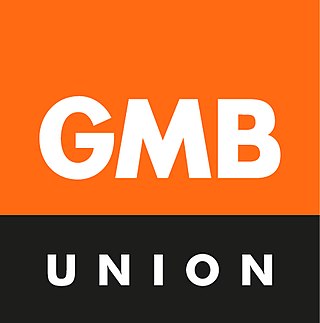Related Research Articles

The GMB is a general trade union in the United Kingdom which has more than 560,000 members. Its members work in nearly all industrial sectors, in retail, security, schools, distribution, the utilities, social care, the National Health Service (NHS), ambulance service and local government.

The Transport and General Workers' Union was one of the largest general trade unions in the United Kingdom and Ireland – where it was known as the Amalgamated Transport and General Workers' Union (ATGWU) to differentiate itself from the Irish Transport and General Workers' Union – with 900,000 members. It was founded in 1922 and Ernest Bevin served as its first general secretary.

William Guthrie Spence, was an Australian trade union leader and politician, played a leading role in the formation of both Australia's largest union, the Australian Workers' Union, and the Australian Labor Party.

The National Union of Seamen (NUS) was the principal trade union of merchant seafarers in the United Kingdom from the late 1880s to 1990. In 1990, the union amalgamated with the National Union of Railwaymen to form the National Union of Rail, Maritime and Transport Workers (RMT).
The National Transport Workers' Federation (NTWF) was an association of British trade unions. It was formed in 1910 to co-ordinate the activities of various organisations catering for dockers, seamen, tramwaymen and road transport workers.
The Dock, Wharf, Riverside and General Labourers Union (DWRGLU), often known as the Dockers' Union, was a British trade union representing dock workers in the United Kingdom, founded in 1887 and merged into the Transport and General Workers' Union in 1922.
The Workers' Union was a general union based in the United Kingdom, but with some branches in other countries. During the 1910s, it was the largest general union in the UK, but it entered a rapid decline in the 1920s, and eventually became part of the Transport and General Workers' Union (TGWU).
The Queensland Council of Unions (QCU) is the peak body of trade union organisations, also known as a labour council, in Queensland, Australia.

The Irish Transport and General Workers Union (ITGWU) was a trade union representing workers, initially mainly labourers, in Ireland.
The United Order of General Labourers was a trade union representing labourers, mostly in the construction industry, in the United Kingdom.
The National Union of General Workers (NUGW) was an early general union in the United Kingdom, the most important general union of its era.

Francis Alfred Broad JP was a Labour politician in the United Kingdom who served as Member of Parliament (MP) for the Municipal Borough of Edmonton during the years 1922–1931 and 1935–1945.
The United Textile Factory Workers' Association (UTFWA) was a trade union federation in Great Britain. It was active from 1889 until 1975.
The National Amalgamated Union of Shop Assistants, Warehousemen and Clerks was a trade union representing retail workers in the United Kingdom.
The United Builders' Labourers Union was a trade union representing labourers in the construction industry in the United Kingdom.
Peter Joseph Tevenan was an Irish-British trade unionist and politician.
Ralph Spence was a British trade unionist.

Alfred James Bailey, was a British Trade Unionist and Liberal Party politician, serving as Lord Mayor of Sheffield.
The Kent and Sussex Agricultural Labourers' Union was a trade union representing farm workers in South East England.
The Amalgamated Shearers' Union of Australasia was an early Australian trade union. It was formed in January 1887 with the amalgamation of the Wagga Shearers Union and Bourke Shearers Union in New South Wales with the Victorian-based Australian Shearers' Union, with William Spence as president and David Temple as secretary.
References
- 1 2 3 Arthur Ivor Marsh, Historical Directory of Trade Unions, p.475
- ↑ National Amalgamated Union of Labour Annual Reports
- 1 2 3 Clegg, H. A. (1954). General Union. Oxford: Basil Blackwell. pp. 15–22.
- ↑ Labour Party, Report of the Executive Committee (1918), pp.115
- ↑ F. W. S. Craig, British Parliamentary Election Results 1885-1918